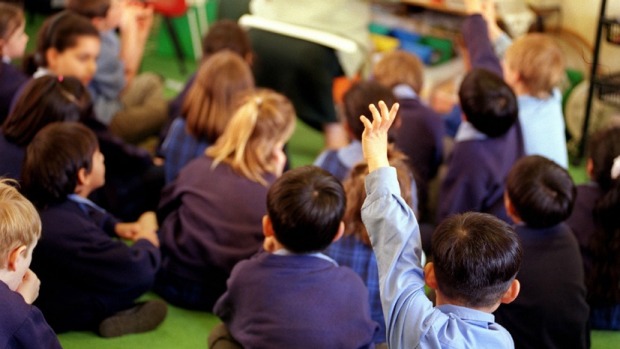Nueva Zelanda/Enero de 2017/Fuente: Stuff
RESUMEN: Los padres pronto podrían enviar a sus hijos a la escuela a los cuatro años bajo un cambio de ley propuesto para los arreglos de entrada a la escuela. La propuesta de que las escuelas tengan la opción de «entrada de cohortes» significaría que los niños comiencen la escuela primaria al comienzo del período más cercano a su quinto cumpleaños, antes que de su sexto. Los padres decidirían si sus hijos entran a la educación formal a la edad de cuatro o cinco años y el Ministerio de Educación creía que el esquema ofrecería mayor flexibilidad a las escuelas, limitaría los costos de educación de la primera infancia para las familias y daría a los nuevos participantes la oportunidad de comenzar la escuela juntos. En su informe sobre la entrada de cohortes, el ministerio observó una tendencia lenta y no reglamentada hacia las escuelas que experimentan con la práctica presentando un «riesgo emergente» para las finanzas de la Corona al incrementar los costos de la educación primaria y de la primera infancia.
Parents could soon be sending their children to school at age four under a proposed law change to school entry arrangements.
The proposal that schools have the option of «cohort entry» would mean children start primary school at the start of the term closest to their fifth birthday, rather than before their sixth.
Parents would decide whether their children enter formal education at age four or five, and the Ministry of Education believed the scheme would offer greater flexibility to schools, limit early childhood education costs for families and give new entrants the opportunity to start school together.
In its report on cohort entry, the ministry noted a slow, unregulated trend towards schools experimenting with the practice presented an «emerging risk» to Crown finances by increasing primary and early childhood education costs.
Several national education groups have opposed the change, which would cost the early childhood sector $11 million if it was adopted by all schools.
The proposal is one of a raft of changes proposed in the Education (Update) Amendment Bill, which is at the select committee stage in Parliament. Submissions on the bill close at the end of the month.
Early Childhood Council chief executive Peter Reynolds called the cohort proposal a «funding cut by stealth».
Childcare centres had lost an average of $900,000 in subsidies since 2010 and the law change, while not necessarily bad for schools, would further hurt smaller early childhood centres if large numbers of their charges left at the same time, he said.
He said suggestions children starting school in groups would be less isolated were a «red herring» as most – 90 per cent according to Government figures – started within two weeks of their fifth birthday and were not long separated from their preschool friends.
Of 1117 public submissions on the cohort proposal, nearly three-quarters were supportive, including 76 per cent of parents and 80 per cent of teachers.
Teachers’ union NZEI, the New Zealand Principals’ Federation, school trustees association, council for educational research and New Zealand Kindergartens are among those who oppose cohort entry.
NZEI president Lynda Stuart said there was no research to suggest group entry provided educational benefits over the current individual system.
«Age five is really early when you look at other countries and the potential is kids could start at age four.
«We have got a really nice way of children entering into schools, it’s almost a rite of passage. It’s an exciting time and also a time where a child can still be evaluated as an individual.»
New Zealand Kindergartens chief executive Clare Wells said if schools were already using cohort entry systems, the education sector could benefit from hearing their experiences.
Portobelo Preschools principal leader Dr Sandy Radford was concerned starting school before age five would hinder children’s cognitive and social development and change the culture of new entrant classrooms.
«Instead of having a culture already established where children already know the ropes, there is whole group who don’t have experienced children to show them how it’s done.»
She hoped children’s individual maturity and abilities would be prioritised over administrative preferences.
Isleworth School principal and Canterbury Primary Principals’ Association president Jeanette Shearer said cohort entry could simplify schools’ enrolment processes.
«In some ways it would be easier to know you are starting with a cohort of children on a particular day rather than constantly transitioning children into your school.»
While it was possible parents whose children were enrolled at age five might feel disadvantaged, it was hard to gauge the community’s feelings because very few families were aware of the proposed change, she said.
Dr Peter Ferrar at Cornerstone Christian School in Palmerston North said he thought most schools would be happy with the change.
He said the school might «have a crack» at cohort entry twice a term but held reservations about starting school before age five, saying it was already too early for many pupils.
Fuente: http://www.stuff.co.nz/national/education/88750698/new-zealand-children-could-start-school-at-age-four-under-cohort-entry-proposal





 Users Today : 28
Users Today : 28 Total Users : 35459934
Total Users : 35459934 Views Today : 33
Views Today : 33 Total views : 3418498
Total views : 3418498